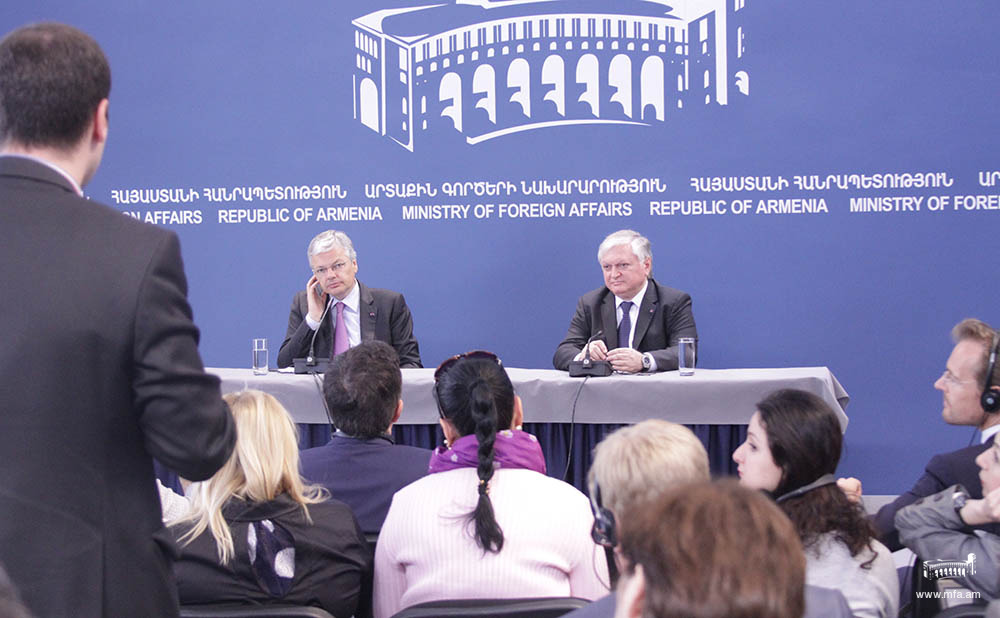Address and Q&A of Foreign Minister of Armenia at the joint press conference with Foreign Minister of Belgium
27 April, 2015Good afternoon!
I am glad to welcome my counterpart, Deputy Prime-Minister, Minister for Foreign Affairs, Foreign Trade and European Affairs of Belgium Didier Reynders, who is in Yerevan also in the position of Chairman of the Committee of Ministers of the Council of Europe.
Today, during negotiations, we enjoyed the opportunity to cover bilateral relations, cooperation within the Council of Europe.
Process of implementation of priorities of Belgian Chairmanship of the Committee of Ministers of the CoE was on the agenda of the talks. Armenia chaired Committee of Ministers in 2013, and once one compares our priorities, they look much similar, not to mention that they coincide on many issues. We salute quite successful Belgian Chairmanship of the CoE that approaches its final stage. On May 19 the meeting of the Ministers will be held, and I confirmed my participation in it.
During the discussions in tête-à-tête format we reflected on the enhancement of the legal framework. We touched upon trade and economic exchange, turnover of which reached 150 mln. US dollars in 2014, that index decreased compared to 2013, when it stood at 200 mln. US dollars. Of course, there is much larger potential in it and we should elaborate new joint projects for fostering of trade and economic cooperation.
There are opportunities for that – numerous business-forums were held, Trade Chamber operates, that exerts considerable efforts in this direction.
We reflected on the development of inter-parliamentary exchanges, touched upon regional and international issues.
Not to forget to mention that Armenia-European Union cooperation took its important place during the negotiations, particularly during the preparatory period to the Riga Summit.
I presented to my counterpart the joint efforts exerted by Armenia and OSCE Minsk Group Co-Chairs directed towards exclusively peaceful settlement of the Nagorno-Karabakh issue.
We exchanged views on various pressing issues on the international agenda – situation in Ukraine, developments in the Middle East and other issues.
I would like to specifically mention that the delegation arrives in Armenia at a time when the Armenian people and the international community commemorate the Armenian Genocide Centenary, pays tribute to the victims. Belgium is among the states that recognized Armenian Genocide back in 1998. Mr. Didier Reynders will visit Tsitsernakaberd today.
We are full of hope that we will continue in the same, maybe more intensive way our active contacts that we continuously had in the past and have now within different frameworks, international conferences, that we continuously used for meetings and exchange of opinions.
Thank you.
Question: (Mediamax) I have two questions, first to you, Mr. Minister. How would you interpret Turkey’s reaction on statements made by different states and organizations on the Armenian Genocide Centenary?
Edward Nalbandian: Regarding Turkey’s reaction, I would rather say, counter-reaction, as during the last days, revently Turkey criticizes everyone, criticizes the Pope, the European Parliament that represents 28 states, Russia, Germany, Austria, to name but a few. I think it would be much easier for Turkey to make just one statement, criticising the entire civilized world for speaking a language that is not comprehensible for Ankara. But as the entire civilized world speaks in one language, and you are not able to grasp it, then you should look inward and realize that maybe the problem is inside yourself.
Question: (Belgian reporter) As long as your state made a choice to join the Eurasian Union, I would like to ask, what expectations do you have from the Eastern Partnership, what does the European Union propose you, what expectations do you have from the Riga Summit?
Edward Nalbandian: I will reiterate what we have stated with the European Union at the Vilnius Summit. Armenia and the European Union issued a joint statement that stresses that Armenia and the European Union are willing to continue comprehensive cooperation in all possible directions, all possible areas and frameworks, given Armenia’s commitments in other integration processes. We reaffirmed that in January this year at the session of Armenia-European Union Cooperation Council, and I think that we should reaffirm that at the Riga Summit.
Question: (H1, Public Television of Armenia) What new meetings are planned within the process of Nagorno-Karabakh settlement issue, and on what level? Thank you.
Edward Nalbandian: My meeting with Co-Chairs is set for April 29 in Paris. The negotiation process in underway, there is no alternative to the negotiation process.


